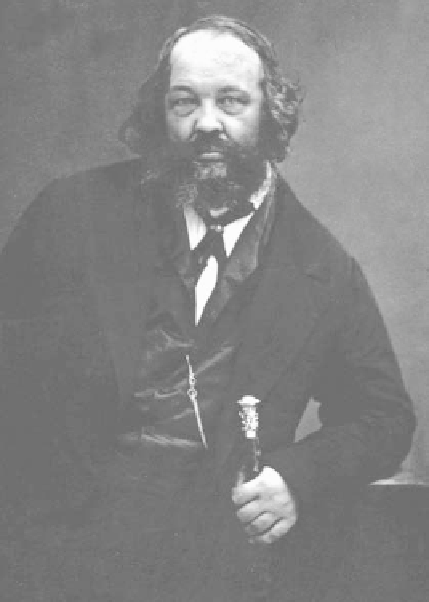Travel Reference
In-Depth Information
tient with the progress of government reforms
and dissatisfied over the terms of the 1861
emancipation of the serfs. In 1869 he founded
the Social Democratic Alliance to advance his
anarchist views. With Karl Marx, Bakunin was
one of the founders of the First International in
1872. However, constant conflict with Marx
over personal and ideological issues soon
resulted in Bakunin's expulsion from the social-
ist movement. His close association with Sergei
NECHAEV
, a controversial revolutionary later
accused of murdering one of his colleagues,
harmed Bakunin's reputation somewhat. Never-
theless, his ideas remained influential through
the 1870s, especially among the expatriate stu-
dents who, upon their return to Russia, formed
the core of the populist crusade, known as the
“Go to the People” movement of 1873-74 that
sought, without success, to convince the peas-
antry about the virtues of revolution.
In his best-known writings such as
Statism and
Anarchy
(1873), Bakunin defended the view that
man is a natural rebel. He challenged revolu-
tionaries to unleash the potential for revolt,
especially found among peasants, whom he ide-
alized. He consistently, and presciently, opposed
the dictatorial potential of the state socialism
advocated by Marx and his followers. Instead, he
advocated an international federation of auto-
nomous communities, where voluntary associa-
tions of workers would engage in productive
work, freed from the oppression inherent in any
form of government or organized authority.
Bakunin spent his final years in Switzerland
and died in Bern. His famous treatise
God and the
State
was published posthumously in 1882. His
ideas, perhaps less suited for the emerging
industrial societies of western Europe, found
unexpectedly strong support among anarchist
peasant communities in Spain and Italy.
Mikhail Bakunin
(Hulton/Archive)
Stankevich Circle for an anarchism that
embraced and romanticized the creative possibil-
ities of violent destruction. During the pan-
European revolutionary upheavals of 1848-49,
Bakunin attended a Pan-Slav congress in Prague
and later surfaced at the revolutionary barri-
cades in Dresden. He was arrested and con-
demned to death, but instead was deported to
Russia, where the authorities exiled him to
Siberia. In prison, he wrote an ambiguously
worded confession to Czar
NICHOLAS I
. In 1861,
after escaping from Siberia by way of Japan, he
arrived in England, where he resumed his revo-
lutionary activism, briefly collaborating with
Aleksandr
HERZEN
in the latter's influential émi-
gré journal,
Kolokol
(The Bell). As Bakunin
developed an anarchist platform that openly
advocated social revolution, his views gained
support among young Russian radicals, impa-
Balanchine, George
(1904-1983)
choreographer and dancer
Born Georgii Melitonovich Balanchivadze to a
talented Georgian family of musicians in St.
Petersburg, Balanchine went on to become one


Search WWH ::

Custom Search